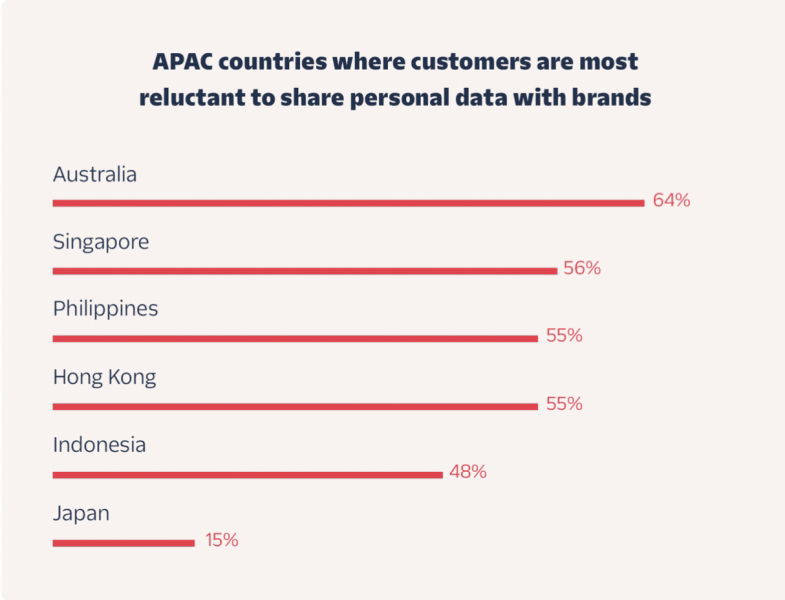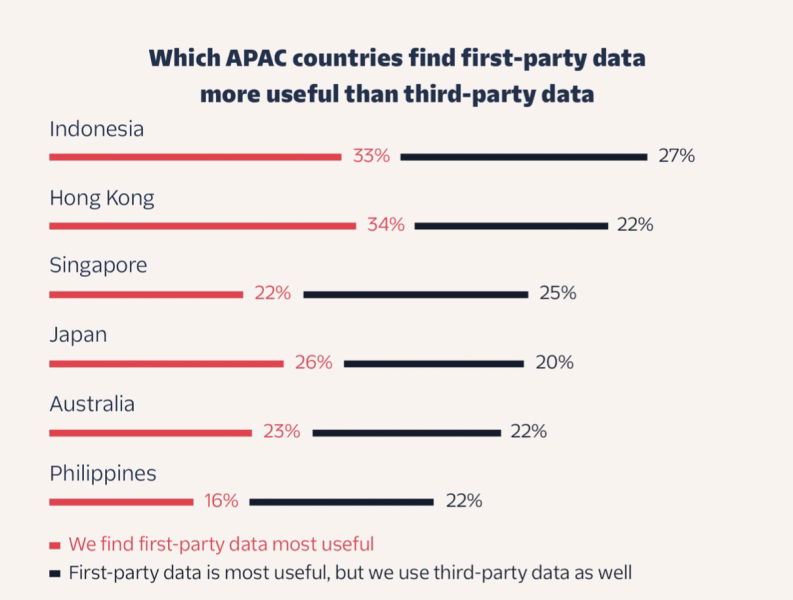
Study: APAC marketers (finally) start embracing the death of third-party cookies
share on
In spite of the initial scepticism around the third-party cookie demise, currently 92% of marketers in the region believe that the move can actually help strengthen trust in advertising among consumers in the long run. Meanwhile, 90% of marketers in the region agree that the death of third-party cookies could lead to higher use of zero-party data - those that are directly and voluntarily shared by customers.
These findings were revealed by Twilio’s report titled “When consumers control data: How to build trust and succeed in the new digital era” those that are directly and voluntarily shared by customers – which are potentially more valuable for marketers.
Additionally, 76% of marketers in APAC have observed a decline in the quality and depth of personal information obtained from third-party data sources – among the factors that have led many to start incorporating zero and first-party data in their marketing strategies ahead of the third-party cookie sunset.

Considered a staple in online advertising for decades, third-party cookies have fueled scepticism in recent years as high-profile breaches shed light on data privacy concerns. However, as consumers get savvier, according to “The Consumer Data Revolution in Asia Pacific” report, 42% of consumers are less inclined to share data with brands that have experienced a major data breach.
Zero is the hero
Of particular value among marketers is zero-party data – which customers intentionally and proactively share through surveys and other direct feedback avenues – as this allows brands to customise marketing efforts based on each consumer’s preferences and motivations; improve services through consumer feedback on issues; and strengthen relationships by creating a better sense of trust.
Based on Twilio’s study, 92% of marketers surveyed in APAC are already collecting zero-party data, primarily through surveys (58%), social media polls (52%), and email campaigns (51%), and this is a step in the right direction, given increased consumer expectations around consent and transparency. Moreover, 64% of consumers in the region are more willing to engage or respond to brands that directly obtain consumer information from them instead of third parties.
Approximately 69% of organisations in APAC have also turned to first-party data besides zero-party data, given inadequate visibility over third parties’ data safeguards, security policies, and procedures.
Unlike zero-party data, which consumers voluntarily share with brands, first-party data is passively being collected as customers interact with an organisation’s owned channels to expand or nurture their existing customer base.
A welcome move by the industry, today, 75% of marketers already have at least a basic understanding of the positive value of first-party data — among which include being more useful in personalising engagement, targeting the right customers, and providing more accuracy, flexibility, and control.

Rethinking the attribution model
While 49% of organisations in the region feel more prepared to ride off to the third-party cookie sunset than they were in 2021, there remains a transition gap towards meaningfully using their zero and first-party data.
The most pressing challenge in data collection among marketers in the region is customer resistance, necessitating a more refined approach to consumer data collection.
Based on The Consumer Data Revolution in Asia Pacific report, 60% of consumers in the region expect clear and understandable information about how their data will be used to increase their trust in brands. Moreover, consumers are more willing to share data with brands that provide good experiences (57%) or are honest and transparent about policies (57%).
Interestingly, consumers are generally open to sharing data that can benefit them in some way – almost half (42%) of consumers are comfortable receiving targeted ads after browsing a product at a department store, and more than half of consumers have said that personalised ads are offering them more options after making a purchase.
Around 74% of the region’s consumers willing to share more information with trusted brands, transparent communication, responsible consumer data usage, and consistent value delivery throughout the customer engagement lifecycle will be the way forward.
“In the new consumer data revolution, it is critical that businesses rethink their approach to data to drive more impactful customer engagement. Trust is now the underpinning factor for marketing success, so brands need to be more transparent in communicating how they are using data to unlock meaningful value for consumers,” said Nicholas Kontopoulos, vice president of marketing, Asia Pacific & Japan, Twilio.
The report, released on the back of The Consumer Data Revolution in Asia Pacific report, includes findings from 600 marketers in APAC-based organisations across Singapore, Hong Kong, Australia, the Philippines, Indonesia, and Japan.
The biggest conference is back! Experience the future of marketing with 500+ brilliant minds at Digital Marketing Asia on 28 - 30 November in Singapore. Uncover groundbreaking strategies that connect leading brands with their target audiences effectively.
Related articles:
Coca-Cola, Pepsi and Redbull top as world’s most valuable non-alcoholic drinks in new study
'AI the key to increased employee productivity', says study
Google's new substitute for cookies: What do Topics spell for the industry?
share on
Free newsletter
Get the daily lowdown on Asia's top marketing stories.
We break down the big and messy topics of the day so you're updated on the most important developments in Asia's marketing development – for free.
subscribe now open in new window
